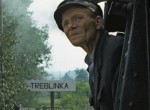Henrik Gawkowski, as seen in Shoah, directed by Claude Lanzmann. (photo from Les Films Aleph/Why Not Productions)
The French intellectual who created what many view as the definitive documentary of the Holocaust is himself the subject of a documentary, called Claude Lanzmann: Spectres of the Shoah.
Commentators in the film are unanimous that Shoah, Lanzmann’s nine-and-a-half-hour study of the Holocaust, is a masterpiece. They also agree that Lanzmann is himself a piece of work.
A former friend calls him a megalomaniac. Another commentator says he is “a very challenging individual.” Through interviews with Lanzmann, the viewer gets a sense of what they are talking about.
Over a 12-year odyssey of interviewing and filmmaking, what Lanzmann set out to create was a film, in his words, “not about the Shoah, but a film that would be the Shoah.”
His first challenge was how he would approach a topic so enormous and distressing.
“What is my theme?” he asks during interviews for the documentary. “The heart of the Shoah, what is it?”
On this he concludes: “Shoah is not a film about survival. And, as it is not a movie about survivors … the survivors are not in Shoah, Shoah is a film about death.”
He recounts an incident that left him hospitalized for a month after a former SS officer’s wife discovered a hidden camera in his bag and Lanzmann and his female assistant were chased, beaten and bloodied by thugs associated with the war criminal. In another instance, Lanzmann relates how he almost drowned while swimming off the coast of Israel. He recalls that he had no gratitude to the individual who saved him and speculates that perhaps he had intended suicide because he knew he could not finish the film in the two years he had been given, with the instruction to keep it under two hours.
As Lanzmann goes on at length about his artistic struggles and the terrible toll the project took on his spirit, a viewer’s empathy may fade. Considering the subject matter of Shoah, lamentations on the difficulties of making a film – however monumental – come across as startlingly self-absorbed. Given the advance billing of Lanzmann’s character with which the documentary begins, the film comes full circle, providing a character sketch of a difficult individual who has done a remarkable thing.
Claude Lanzmann: Spectres of the Shoah double bills with What Our Fathers Did: A Nazi Legacy at the Vancouver Jewish Film Festival (vjff.org) on Nov. 11, 3:30 p.m.

